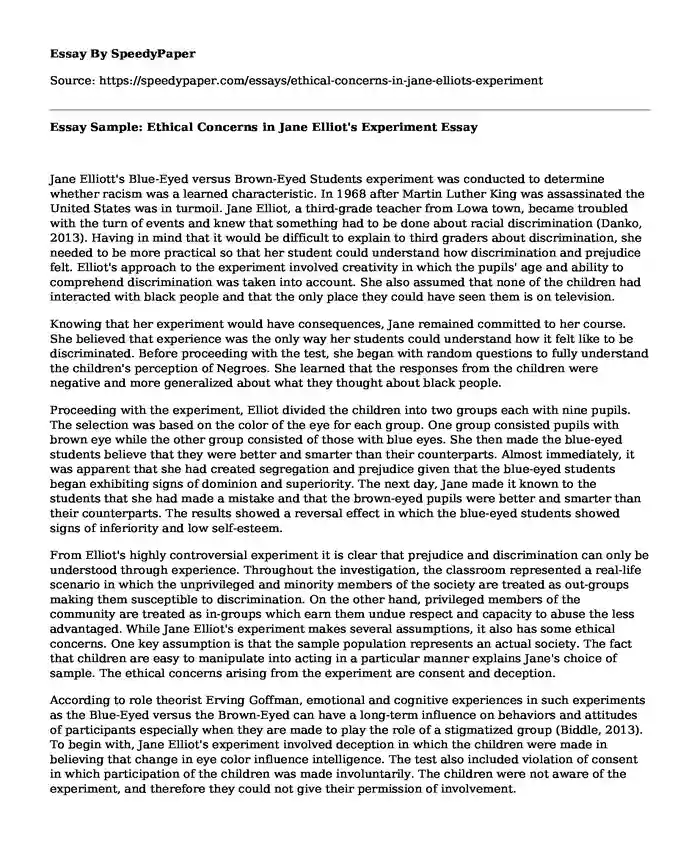Jane Elliott's Blue-Eyed versus Brown-Eyed Students experiment was conducted to determine whether racism was a learned characteristic. In 1968 after Martin Luther King was assassinated the United States was in turmoil. Jane Elliot, a third-grade teacher from Lowa town, became troubled with the turn of events and knew that something had to be done about racial discrimination (Danko, 2013). Having in mind that it would be difficult to explain to third graders about discrimination, she needed to be more practical so that her student could understand how discrimination and prejudice felt. Elliot's approach to the experiment involved creativity in which the pupils' age and ability to comprehend discrimination was taken into account. She also assumed that none of the children had interacted with black people and that the only place they could have seen them is on television.
Knowing that her experiment would have consequences, Jane remained committed to her course. She believed that experience was the only way her students could understand how it felt like to be discriminated. Before proceeding with the test, she began with random questions to fully understand the children's perception of Negroes. She learned that the responses from the children were negative and more generalized about what they thought about black people.
Proceeding with the experiment, Elliot divided the children into two groups each with nine pupils. The selection was based on the color of the eye for each group. One group consisted pupils with brown eye while the other group consisted of those with blue eyes. She then made the blue-eyed students believe that they were better and smarter than their counterparts. Almost immediately, it was apparent that she had created segregation and prejudice given that the blue-eyed students began exhibiting signs of dominion and superiority. The next day, Jane made it known to the students that she had made a mistake and that the brown-eyed pupils were better and smarter than their counterparts. The results showed a reversal effect in which the blue-eyed students showed signs of inferiority and low self-esteem.
From Elliot's highly controversial experiment it is clear that prejudice and discrimination can only be understood through experience. Throughout the investigation, the classroom represented a real-life scenario in which the unprivileged and minority members of the society are treated as out-groups making them susceptible to discrimination. On the other hand, privileged members of the community are treated as in-groups which earn them undue respect and capacity to abuse the less advantaged. While Jane Elliot's experiment makes several assumptions, it also has some ethical concerns. One key assumption is that the sample population represents an actual society. The fact that children are easy to manipulate into acting in a particular manner explains Jane's choice of sample. The ethical concerns arising from the experiment are consent and deception.
According to role theorist Erving Goffman, emotional and cognitive experiences in such experiments as the Blue-Eyed versus the Brown-Eyed can have a long-term influence on behaviors and attitudes of participants especially when they are made to play the role of a stigmatized group (Biddle, 2013). To begin with, Jane Elliot's experiment involved deception in which the children were made in believing that change in eye color influence intelligence. The test also included violation of consent in which participation of the children was made involuntarily. The children were not aware of the experiment, and therefore they could not give their permission of involvement.
Focusing on ethics the experiment violated some of the principles and codes of conduct established by the American Psychological Association. The test violated the principle of respect for people's rights and dignity. Though Jane's actions were justifiable because she was not a psychologist, her experiment cannot be replicated in the present society. APA principles acknowledge that individuals rights to privacy, self-determination, and confidentiality is paramount to all psychological activities. Regardless of age, gender, race, ethnicity or socioeconomic status, decision making in psychology should protect individual rights and welfare to eliminate potential biases.
According to the Ethical Principles of Psychologists and Code of Conduct, 2010 the experiment also violates the principle of Integrity. In present society, psychological experiments are guided by honesty, truthfulness, and accuracy. Jane Elliot's experiment involves cheating and intentional misinterpretation of facts. The American Psychologists Principles and code of conduct state that in cases of deception, experimenters should take into consideration the potential harmful effects to participants. Given the long-term results of the experiment, the controversial study could not have taken place in today's society despite its significant insights on matters racism.
Jane Elliot's experiment explains the reasons for discrimination to a small extent. However, the study shows some bias in the sample size and race of participants. Despite the adaptation of the experiment in psychological studies, Jane has been widely criticized for her unethical conduct and promotion of discrimination among children. The study also violates the American Principles of Psychologist codes of conduct making its replication or further investigation unethical. Although actions from the experiment show lack of respect towards subjects it has widely been recognized in the study of human behavior in social and cultural context.
References
Biddle, B. J. (2013). Role Theory: Expectations, Identities, and Behaviors. New York: Elsevier Science.
Danko, M. (2013). 10 Psychological Experiments That Could Never Happen Today. Mental Floss, 4.
Ethical Principles of Psychologists and Code of Conduct. (2010). American Psychological Association, 4.
Cite this page
Essay Sample: Ethical Concerns in Jane Elliot's Experiment. (2022, Apr 06). Retrieved from https://speedypaper.net/essays/ethical-concerns-in-jane-elliots-experiment
Request Removal
If you are the original author of this essay and no longer wish to have it published on the SpeedyPaper website, please click below to request its removal:
- Essay Example on the American Revolution Facts
- Free Essay Sample on Organizational Code of Ethics
- Oceanography Essay Example: The Blob
- Economics Essay Example for Students
- Essay Sample Dedicated to Thomas Jefferson and Sally Hemings Controversy
- Essay Example on How People Incorporate Organic Foods Into Their Diet
- Essay Sample on Writing Feedback and Student Self-Efficacy
Popular categories





